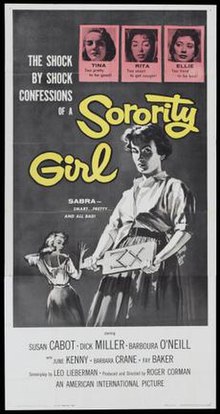This article needs additional citations for verification. (September 2014) |
Sorority Girl (also known as Sorority House or The Bad One) is a 1957 film noir exploitation film directed by Roger Corman. It stars Susan Cabot as Sabra, a sociopath who plays a very disruptive role in a sorority, with Barboura Morris, Dick Miller and June Kenney. It was released by American International Pictures as a double feature with Motorcycle Gang.[1]
| Sorority Girl | |
|---|---|
 | |
| Directed by | Roger Corman |
| Written by | Leo Lieberman Ed Waters |
| Produced by | Roger Corman |
| Starring | Susan Cabot Barboura Morris |
| Music by | Ronald Stein |
Production company | Sunset Productions |
| Distributed by | American International Pictures |
Release date |
|
Running time | 62 mins. |
| Country | United States |
| Language | English |
In England, it was known as The Bad One.[2] The film was remade in 1994 as Confessions of a Sorority Girl.[citation needed]
Plot
editThis article needs an improved plot summary. (July 2024) |
A spoiled rich girl named Sabra Tanner (who feels ignored by her rich mother) teases and harasses her college schoolmates even though she doesn't know why she wants to hurt all the people around her. Her sociopathic antics bring bad consequences for her when her actions drive one of her classmates to suicide. Realizing she is completely ostracized, Sabra walks into the ocean to drown herself.
Cast
edit- Susan Cabot as Sabra Tanner
- Dick Miller as Mort
- Barboura Morris (credited as Barboura O'Neill) as Rita Joyce
- June Kenney as Tina
- Fay Baker as Mrs. Tanner
- Barbara Cowan (credited as Barbara Crane) as Ellie Marshall
- Jeane Wood as Mrs. Fessenden, the housemother
Production
editCorman stated that the script was developed by AIP. He did not like it and had some of it rewritten, although not as much as he wanted.[3]
Filming started on July 15, 1957 at Ziv Studios.[4] Some scenes took place at the mansion of Ruta Lee in Laurel Canyon.[5]
Susan Cabot later recalled working on Corman's films:
We would have some sort of a script, but there was a lot of, "Who's going to say what?" and "How 'bout I do this?" — plenty of ad-libbing and improvising. But Roger was really great in a way; he was very loose. If something didn't work out, he changed it right away. He gave me a great amount of freedom, and also a chance to play parts that Universal would never have given me — oddball, wacko parts, like the very disturbed girl in Sorority Girl. I had a chance to do moments and scenes that I didn't get before.[6]
Corman later recounted filming an emotional scene with Cabot, first via a medium shot, then via a close-up, and that her performance in the scene wasn't as strong using the latter. This prompted him to learn more about acting, so he enrolled in acting classes given by Jeff Corey, where he met Jack Nicholson and Robert Towne.[7]
Release
editSorority Girl was issued on a double bill with Motorcycle Gang.[8][9] The Christian Science Monitor said the film was a "sad hodgepodge of a story".[10]
See also
editReferences
edit- ^ Sanders, Don and Susan (1997). The American Drive-In Movie Theatre. Motorbooks International. p. 121. ISBN 0-7603-0425-4.
- ^ "BAD ONE". The Monthly Film Bulletin. Vol. 25, no. 288. London. January 1, 1958. p. 60.
- ^ di Franco, J. Philip, ed. (1979). The Movie World of Roger Corman. Chelsea Publishing Company. p. 10.
- ^ "MOVIELAND EVENTS: Screen Writing Gets Remarque Attention". Los Angeles Times. July 5, 1957. p. A5.
- ^ Weaver, Tom (2004). "The Saga of a Corman Stock Player". Cult Movies. No. 41. pp. 52–59.
- ^ "Wasps! Vikings! Sea Serpents!". Fangoria. No. 52. 1986.
- ^ Corman, Roger; Jerome, Jim (1998). How I made a hundred movies in Hollywood and never lost a dime. Da Capo Press. pp. 42–43.
- ^ Smith, Gary A. (2013). American International Pictures: The Golden Years. BearManor Media. p. 64.
- ^ "Romances of Cycle Hounds Told in Film". Los Angeles Times. November 22, 1957. p. B12.
- ^ "'Sorority Girl' At Paramount". The Christian Science Monitor. December 12, 1957. p. 8.